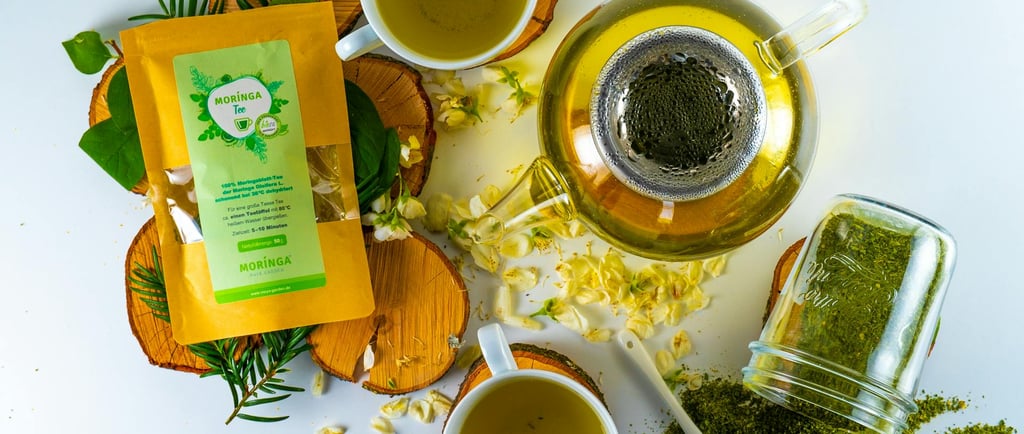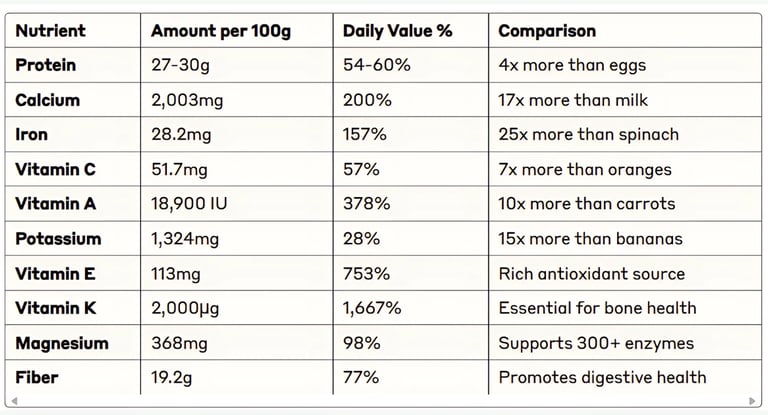What Happens If You Take Moringa Powder Every Day? The Science-Backed Truth You Need to Know
Discover what happens if you take moringa powder daily. Learn science-backed benefits, nutrition facts, safe dosage, side effects, and best practices for adding moringa to your routine.
HEALTHLANDING PAGE


Did you know that taking just one teaspoon of moringa powder daily could provide your body with more vitamin C than three oranges? This "miracle tree" has quietly become one of the most talked-about superfoods of 2024, but what really happens when you make moringa powder a daily habit?
This comprehensive guide explores what happens to your body with consistent moringa consumption based on scientific evidence.
What is Moringa Powder and Why Take it Daily?
Moringa powder comes from the dried leaves of Moringa oleifera, also known as the "tree of life" or "drumstick tree," and is classified as an important herbal plant due to its immense medicinal and non-medicinal benefits. Native to India, this nutrient-dense superfood has been used in traditional medicine for centuries.
The daily moringa powder trend has exploded because of its impressive nutritional profile. Unlike synthetic supplements, moringa provides nutrients in their natural form, making them easier for your body to absorb and use.
Moringa Powder Nutritional Profile
Nutritional Impact of Daily Moringa Consumption
Exceptional Protein and Mineral Boost
Daily moringa powder consumption delivers substantial nutritional benefits. Research shows moringa leaves contain an average of 27.1% protein along with significant amounts of calcium (520 mg/100g), magnesium (82.6 mg/100g), and iron (7.7 mg/100g). This protein content is two times greater than milk, making it particularly valuable for vegetarians and those with limited access to animal protein sources.
Enhanced Food Fortification
The high nutritional density means that incorporating moringa leaf powder into foods like breads, pastries, and snacks significantly increases their protein, essential amino acids, minerals, and fiber content. Studies show that adding just 1% moringa leaf powder to children's snacks improved nutritional composition with higher concentrations of calcium, magnesium, potassium, phosphorus, zinc, manganese, iron, and crude protein.
Evidence-Based Health Benefits of Daily Moringa Use
Blood Pressure and Cardiovascular Support
Moringa contains compounds that may help manage blood pressure naturally. In a 2021 study, healthy participants who consumed 120 grams of cooked moringa leaves for a week showed lower blood pressure two hours after eating compared to the control group. However, the authors noted that further human trials are necessary to confirm effectiveness and safety for cardiovascular health management.
Blood Sugar Management
Research demonstrates that moringa powder can help reduce blood glucose levels in diabetic patients by significant amounts. Animal studies show that 2g of leaf powder per kilogram decreased blood glucose levels by 23% relative to controls. These bioactive compounds make moringa beneficial for treating chronic conditions like diabetes and insulin resistance.
Antioxidant and Anti-Inflammatory Properties
Daily moringa intake provides powerful antioxidant properties that help protect cells against free radicals produced by digesting food, smoking, and radiation exposure. The anti-inflammatory effects may offer particular benefits for women's health, with research suggesting regular anti-inflammatory treatment like moringa powder may provide greater protection from breast cancer.
Additional Therapeutic Benefits
Moringa's bioactive compounds, including vitamins, flavonoids, and alkaloids, may help treat various conditions, including non-alcoholic liver disease, cancer, and overall inflammation. Studies also suggest potential benefits for treating anemia, supporting weight loss, and improving insulin sensitivity.
Safe Daily Dosage: How Much Moringa Powder Should You Take?
Recommended Daily Limits
Consuming moringa powder is proven safe, even at higher levels. The recommended daily dosage should be limited to the equivalent of 70 grams of moringa leaves per day or 11 teaspoons of moringa powder. However, it's essential to consult with a healthcare provider before starting supplementation.
Clinical Safety Data
Human studies demonstrate excellent safety profiles with no adverse effects reported at single doses up to 50g or daily doses of 8g for 40 days. A typical effective dose in animal studies translates to approximately 3.9g for an 80kg human, suggesting most therapeutic benefits occur well within safe limits.
Potential Side Effects and Daily Use Risks
Medication Interactions
Moringa can interact with thyroid drugs, diabetes medications, and hypertension medications. It may potentiate effects of antihypertensive and antidiabetic drugs, potentially causing dangerously low blood pressure or blood sugar levels. Those on chronic medications should always consult a doctor before use.
Thyroid Concerns
Moringa may have a suppressive effect on T4 conversion to T3, potentially decreasing levothyroxine effectiveness for hypothyroidism treatment. If taking levothyroxine, consider spacing moringa consumption 3 hours before or after medication.
Digestive Effects
Higher doses may cause nausea, gas, and diarrhea due to moringa's detoxifying and laxative properties. Starting with small amounts initially can minimize digestive upset.
Pregnancy and Fertility Considerations
Pregnant women should avoid moringa powder unless approved by a healthcare provider. Some parts of the moringa plant, particularly the root and bark, can cause uterine contractions that may lead to complications or miscarriage. Animal studies suggest potential anti-fertility effects.
Quality and Safety Concerns
Heavy Metal Contamination Risk
Low-quality moringa powder from untrusted sources may contain harmful heavy metals like lead and arsenic if grown in contaminated soil. To avoid this risk, purchase certified organic moringa powder that is third-party lab-tested from reputable brands.
Liver and Kidney Stress
Excessive consumption may increase the risk of liver or kidney issues, especially for those with existing organ-related conditions. Following prescribed daily limits is crucial for safety.
Best Practices for Daily Moringa Use
Starting Guidelines
Begin with small amounts (¼ to ½ teaspoon daily) and gradually increase
Take with food to improve absorption and reduce digestive upset
Choose organic, third-party tested products from reputable sources
Monitoring and Medical Supervision
Consult healthcare providers before starting, especially if on medications
Monitor blood pressure and blood sugar levels if using for these conditions
Discontinue use if allergic reactions like rashes or swelling occur
Who Should Consume Moringa Powder Daily?
Daily moringa supplementation may be particularly beneficial for:
Vegetarians and vegans seeking plant-based protein and mineral enhancement
Individuals with limited access to diverse protein sources
Those looking to fortify their diet with antioxidants and anti-inflammatory compounds
People seeking complementary support for blood pressure or blood sugar management under medical supervision
Long-Term Daily Use: What to Expect
With consistent daily use within safe dosage limits, most users can expect:
Improved overall nutritional status through enhanced protein and mineral intake
Potential modest improvements in blood pressure and blood sugar markers
Enhanced antioxidant protection against cellular damage
Possible digestive changes that typically normalize with the gradual introduction
The Bottom Line
Taking moringa powder every day can be a nutritious addition to most people's wellness routine. The concentrated nutrients, antioxidants, and potential health benefits make it an attractive natural supplement option.
However, remember that moringa powder isn't a magic cure-all. It works best as part of a balanced diet and healthy lifestyle. Start slowly, listen to your body, and consult healthcare providers if you have underlying health conditions.

